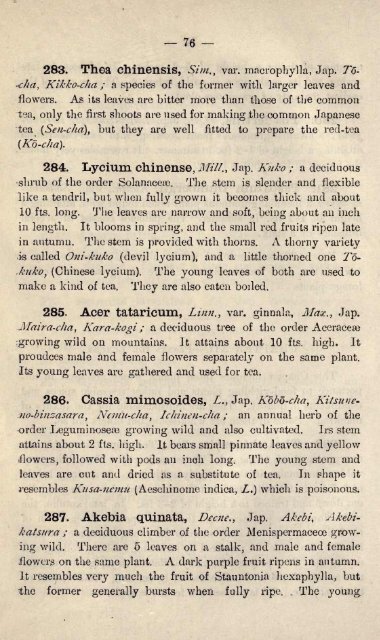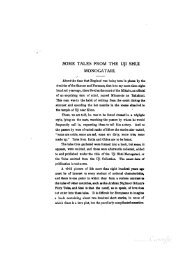Untitled - University of Oregon
Untitled - University of Oregon
Untitled - University of Oregon
Create successful ePaper yourself
Turn your PDF publications into a flip-book with our unique Google optimized e-Paper software.
76<br />
283. Thea Chinensis, Sim., var. macrophylla, Jap. To-<br />
, Kikko-cha ; a species <strong>of</strong> the former with larger leaves and<br />
flowers. As its leaves are bitter more than those <strong>of</strong> the common<br />
tea, only the first shoots are used for making the common Japanese<br />
tea (Sen-cha), but they are well fitted to prepare the red-tea<br />
(Ko-c/ia).<br />
284. Lycium chinense, Mil!., Jap. Kuko ; a deciduous<br />
shrub <strong>of</strong> the order Solanacete. The stem is slender and flexible<br />
like a tendril, but when fully grown it becomes thick and about<br />
10 fts. long. The leaves are narrow and s<strong>of</strong>t, being about an inch<br />
in length.<br />
It blooms in spring, and the small red fruits ripen late<br />
in autumn. The stem is provided with thorns. A thorny variety<br />
.is called Oni-kuko (devil lycium), and a little thorned one To-<br />
.kuko, (Chinese lycium). The young leaves <strong>of</strong> both are used to<br />
make a kind <strong>of</strong> tea. They are also eaten boiled.<br />
285. Acer tataricum, Linn., var. ginnala, Max., Jap.<br />
Maira-c/ia, Kara-kogi ; a deciduous tree <strong>of</strong> the order Aceraceae<br />
;growing wild on mountains. It attains about 10 fts. high. It<br />
proudces male and female flowers separately on the same plant.<br />
Its young leaves are gathered and used for tea.<br />
286. Cassia mimosoides, L., Jap. Kobo-cha, Kitsun e-<br />
.no-binzasara, Ncmu-cha, IcJiinen-cJia ; an annual herb <strong>of</strong> the<br />
order Leguminosea3 growing wild and also cultivated. Irs stem<br />
attains about 2 fts. high. It bears small pinnate leaves and yellow<br />
flowers, followed with pods an inch long.<br />
The young stem and<br />
leaves are cut and dried as a substitute <strong>of</strong> tea. In shape it<br />
resembles Kusa-nemu (Aeschinome indica, L.) which is poisonous.<br />
287. Akebia quinata, Decne., Jap. Akebi, AkMkatsura<br />
; a deciduous climber <strong>of</strong> the order jMenispermacece growing<br />
wild. There are 5 leaves on a stalk, and male and female<br />
.flowers on the same plant. A dark purple fruit ripens in autumn.<br />
It resembles very much the fruit <strong>of</strong> Stauntonia hexaphylla, but<br />
the former generally bursts when fully ripe. The young

















